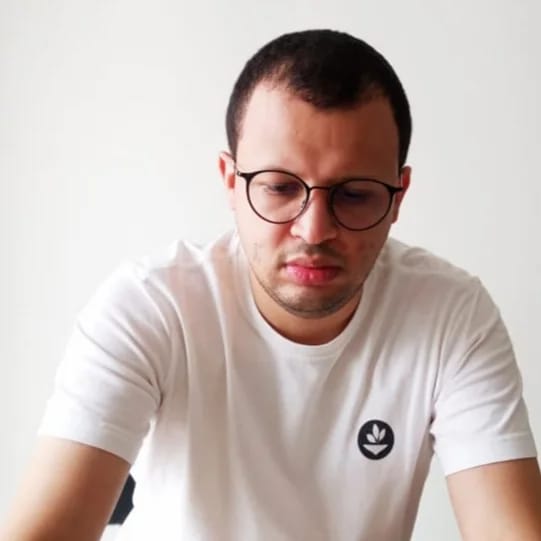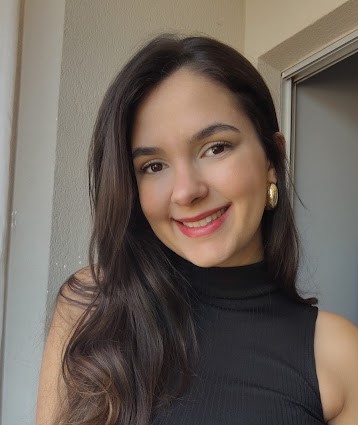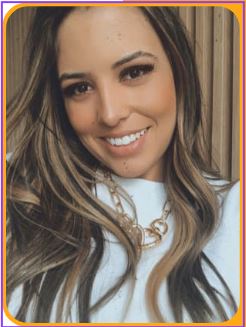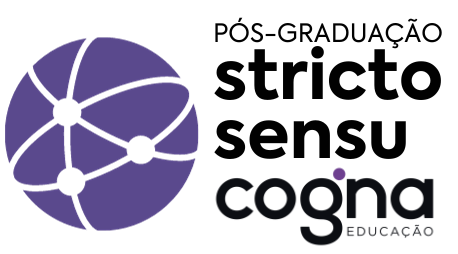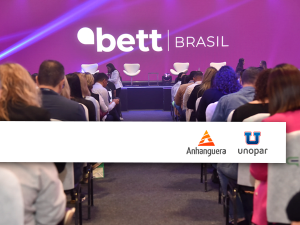
Post-graduate
Stricto Sensu
Master's Course in
Methodologies for Teaching Languages and Its Technologies
Selective Process 2024/1
Assessments
(Online)
02//19 at 02/23/2024
Registration
03/05 at 03/07/2024
Selection Process for Financial Support
UNOPAR 2024/1- PROSUP/CAPES
Previous Selection Processes
- EDITAL – Resultado Processo Seletivo Doutorado Sanduíche 2023/2
- EDITAL – Processo Seletivo Doutorado Sanduíche 2023/2
- EDITAL – Resultado Processo Seletivo Estudante Especial 2023/2
- EDITAL – Processo Seletivo Estudante Especial 2023/2
- EDITAL – Resultado Processo Seletivo 2023/2
- ADITAMENTO – Processo Seletivo 2023/2
- EDITAL – Processo Seletivo 2023/2
- Estágio Pós-Doutoral Voluntário 2023/1 – Resultado
- Estágio Pós-Doutoral Voluntário 2023/1 – Edital
- Resultado – Estudante Especial 2023/1
- Aditamento – Estudante Especial 2023/1
- Edital – Estudante Especial 2023/1
- Edital PROSUP/CAPES 2023.1
- Edital PRPPG Nº 024/2022 – Resultado Estudante Especial
- Edital PRPPG Nº 019/2022 – Estudante Especial
- Aditamento Nº 007/2022 ao Edital PRPPG Nº 015/2022
- Processo Seletivo PROSUP/CAPES 2022/2 – Edital
- Ofício cotas extras PROSUP 2022/2
- Processo Seletivo Pós-Doutoral Voluntário – EDITAL
- Processo Seletivo Pós-Doutoral Voluntário – RESULTADO
- EDITAL PRPPG Nº005/2022 – Resultado
- Edital PROSUP/CAPES
- Estágio Pós-Doutorado Voluntário 2021/2 – Edital
- Estágio Pós-Doutorado Voluntário 2021/2 – Resultado
- Processo Seletivo PNPD Voluntário 2021 – Edital
- Processo Seletivo PNPD Voluntário 2021 – Resultado
- Processo Seletivo Bolsa/Taxa Prosup – Mestrado – Edital
- Processo Seletivo Bolsa/Taxa Prosup – Mestrado – Resultado
- Processo Seletivo Bolsa/Taxa Prosup – Doutorado – Edital
- Processo Seletivo Bolsa/Taxa Prosup – Doutorado – Resultado
- Processo Seletivo 2021 – Mestrado – Edital
- Processo Seletivo 2021 – Mestrado – Resultado
- Processo Seletivo PDSE 2021 – Edital
- Processo Seletivo PDSE 2021 – Resultado
Presentation
The Post-Graduate Program in Methodologies for the Teaching of Languages and Its Technologies of UNOPAR, had the Master approved at the 144th Meeting of the Technical-Scientific Council of Higher Education – CTC-ES/CAPES and the Doctorate in Methodologies for the Teaching of Languages and Its Technologies was approved at the 182nd Meeting of CTC-ES/CAPES. The Program consists of integrated teaching, research and extension activities, which aim to train teachers and teaching professionals. It focuses on the development of research to respond to demands for different ways of learning, based on the understanding and construction of innovative teaching methodologies.
Objectives of the Program
To train, from an interdisciplinary perspective, researchers and professionals in the teaching/education area to develop actions, strategies, programs and policies in the area of education at the basic and higher level;
To promote research activities linked to the basic education network through university extension activities;
To develop research centers on subjects related to teaching, articulating and expanding scientific, technological and cultural production, committing to their wide socialization;
To articulate actions with undergraduate education and lato sensu specialization with a view to the production of knowledge in the area of teaching;
Contribute to the increase of the general quality of university education in undergraduate and extra university degrees.
Target Audience
Holders may apply of university degrees in undergraduate and bachelor degrees with training and/or work in the area of Teaching/Education.
Concentration Areas
- Teacher Training and teaching action in teaching situations: To understand the process of training of education professionals in the historical, political, cultural and social dimensions, as well as their role in the educational system. To analyze the theoretical and methodological principles of teaching action, supported by teacher training policies and the use of new technologies to develop and validate projects and processes in the field of face-to-face or virtual teaching. To develop skills and abilities to plan, program, deploy and evaluate the multicultural landscape of the school space. To articulate projects to educational processes of formal, non-formal, open and mediated learning.
- Teaching of Languages and Its Technologies: To investigate teaching-learning processes in face-to-face and virtual environments. To deepen the studies of methodological processes, their languages and technologies and the appropriation of these elements in the school space. To discuss collaborative work; dialogue; procedural evaluation and investigation of the potential of pedagogical use of tools in the teaching-learning process, as well as their interaction with new media and languages in teaching situations.
Subjects
- The construction of the School in Brazil and the policies for teaching / 45 hours – 3 Credits
- Teaching, technology and languages: Theoretical and methodological aspects / 45 hours – 3 Credits
- Internship in Teaching at / 45 Hours – 3 Credits
- Approaches to Health Research / 45 hours – 3 Credits
- Research seminars / 45 Hours – 3 Credits
- Content analysis as a methodological strategy for implementing the concepts of Hybrid Education/ 30 hours 2 credits.
- The elaboration of scientific productions: an experience mediated by digital technologies / 30 hours 2 credits
- Virtual Teaching and Learning Environments/30 hours 2 credits
- Playfulness and Technologies in Teaching and Learning Situations/ 30 Hours 2 credits
- Institutional teacher training programs /30 hours 2 credits
- Learning Projects with Digital Technologies: Principles and Implications / 30 hours 2 credits
- Digital Curatorship in the Teaching Process /30 hours 2 credits
- Special Topics/30 Hours 2 Credits
- Learning Theories / 30 hours 2 credits
- Theories of Knowledge/ 30 credits 2 credits
- Teacher Training and professional development/30 hours 2 credits
- Teacher training and pedagogical practices /30 hours 2 credits
- Curricular Development /30 Hours 2 Credits
- Educational Evaluation: Functions, Instruments and Planning Educational Assessment: Functions, Instruments and Planning /30 Hours 2 credits
- Pedagogical processes mediated by information and communication technology /30 hours 2 credits
- Strategies for EAD Education and Hybrid Education/30 hours 2 credits
- Trends in Mathematics Education / 30 hours 2 credits
- Inclusive education and its technologies /30 hours 2 credits
- Trends in Science Teaching /30 hours 2 credits
- Reference Practices in the Teaching of Nature Sciences /30 hours 2 credits
- Epistemology and Didactics of Mathematical Contents of Basic Education/ 30 hours 2 credits
- Teaching Reading and Text Production/ 30 hours 2 credits
- Interfaces of Mathematics with other areas of knowledge/30 hours 2 credits
- Literacy and the Transition to Higher Education/ 30 hours 2 credits
- Teaching, Society and Diversities/ 30 hours 2 credits
- Environmental Education and Teaching/ 30 hours 2 credits
- History of Mathematics Education in Brazil / 30 hours 2 credits
- Scheduled activities
- The construction of the School in Brazil and the policies for teaching / 45 hours – 3 Credits
- Teaching, technology and languages: Theoretical and methodological aspects / 45 hours – 3 Credits
- Internship in Teaching at / 45 Hours – 3 Credits
- Strategies for Development of Advanced Research Projects / 45 Hours – 3 Credits
- Research seminars / 45 Hours – 3 Credits
- Content analysis as a methodological strategy for implementing the concepts of Hybrid Education/ 30 hours 2 credits.
- The elaboration of scientific productions: an experience mediated by digital technologies / 30 hours 2 credits
- Virtual Teaching and Learning Environments/30 hours 2 credits
- Playfulness and Technologies in Teaching and Learning Situations/ 30 Hours 2 credits
- Institutional teacher training programs /30 hours 2 credits
- Learning Projects with Digital Technologies: Principles and Implications / 30 hours 2 credits
- Digital Curatorship in the Teaching Process /30 hours 2 credits
- Special Topics/30 Hours 2 Credits
- Learning Theories / 30 hours 2 credits
- Theories of Knowledge/ 30 credits 2 credits
- Teacher Training and professional development/30 hours 2 credits
- Teacher training and pedagogical practices /30 hours 2 credits
- Curricular Development /30 Hours 2 Credits
- Educational Evaluation: Functions, Instruments and Planning Educational Assessment: Functions, Instruments and Planning /30 Hours 2 credits
- Pedagogical processes mediated by information and communication technology /30 hours 2 credits
- Strategies for EAD Education and Hybrid Education/30 hours 2 credits
- Trends in Mathematics Education / 30 hours 2 credits
- Inclusive education and its technologies /30 hours 2 credits
- Trends in Science Teaching /30 hours 2 credits
- Reference Practices in the Teaching of Nature Sciences /30 hours 2 credits
- Epistemology and Didactics of Mathematical Contents of Basic Education/ 30 hours 2 credits
- Teaching Reading and Text Production/ 30 hours 2 credits
- Interfaces of Mathematics with other areas of knowledge/30 hours 2 credits
- Literacy and the Transition to Higher Education/ 30 hours 2 credits
- Teaching, Society and Diversities/ 30 hours 2 credits
- Environmental Education and Teaching/ 30 hours 2 credits
- History of Mathematics Education in Brazil / 30 hours 2 credits
- Scheduled activities
Course Teachers
Research Line 1
Research Line 2
Contacts
Professor PhD Samira Fayez Kfouri
Coordinator of the Stricto Sensu Graduate Program in Methodologies for Teaching Languages and Its Technologies
E-mail: mestradoensino@unopar.br
Academic Control
E-mail: controleacademico@kroton.com.br
News

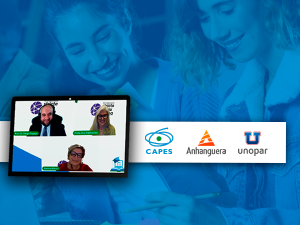
Programas Iniciação à Docência e Residência Pedagógica da CAPES oportunizam uma formação diferenciada aos alunos da Unopar Anhanguera
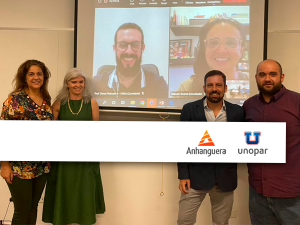
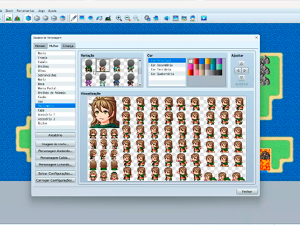
“Como utilizar o RPG maker no processo de ensino e aprendizagem” é o tema de dissetação de mestranda do PPGENS – Anhanguera Unopar
CONTROLE ACADÊMICO (Mestrado e Doutorado)
- controleacademico@kroton.com.br
DIVULGAÇÃO
- editora@kroton.com.br
Comitê de Ética em Pesquisa - CEP
- cep@unopar.br
Comissão de Ética no Uso de Animais – CEUA
- ceua@unopar.br




